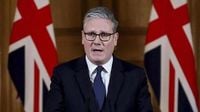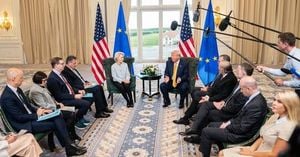The United Kingdom is poised to make a historic shift in its Middle East policy, with Prime Minister Sir Keir Starmer expected to formally announce the UK's recognition of a Palestinian state on Sunday afternoon, September 21, 2025. According to BBC and other major outlets, this move marks a dramatic departure from the UK’s longstanding position, which had previously tied recognition to the conclusion of a peace process and the moment of maximum diplomatic impact.
The anticipated announcement follows a period of mounting urgency and tragedy in the region. In July, Prime Minister Starmer had warned that Britain would change its stance unless Israel agreed to a ceasefire in Gaza and committed to a sustainable peace process that would lead to a two-state solution. That deadline, aligned with the UN General Assembly meeting this week, has now arrived without the required progress from Israel. Government sources cited by BBC note that the situation on the ground has deteriorated sharply in recent weeks, with images of starvation and violence in Gaza described by the prime minister as "intolerable."
The scale of the humanitarian crisis is staggering. As reported by Haaretz and confirmed by the Israeli Defense Forces (IDF), more than 500,000 people—about half of Gaza City’s population—have been evacuated amid ongoing military operations. In just the past day before the announcement, Israeli fire killed 51 people in Gaza, including 26 in Gaza City, according to medics cited by international news agencies. The IDF claims these operations are targeting Hamas militants and creating corridors for civilian evacuation, but the cost in civilian lives and displacement has drawn global condemnation.
International scrutiny intensified earlier this week when a United Nations commission of inquiry concluded that Israel had committed genocide against Palestinians in Gaza—a charge that Israel fiercely rejects as "distorted and false." The UN report, coupled with the relentless expansion of Israeli settlements in the West Bank, including the controversial E1 project, has been cited by UK ministers as key factors in the decision to move forward with recognition. Justice Secretary David Lammy, who served as foreign secretary when the path to recognition was first announced, pointed to these developments as undermining the viability of a contiguous Palestinian state. "The recognition of a Palestinian state is as a consequence of the serious expansion that we're seeing in the West Bank, the settler violence that we're seeing in the West Bank, and the intention and indications that we're seeing to build for example the E1 development that would run a coach and horses through the possibility of a two-state solution," Lammy said, as reported by BBC.
The move has been welcomed by Palestinian leaders. Palestinian Authority president Mahmoud Abbas expressed his approval during a visit to London earlier this month, with Downing Street emphasizing that both parties agreed Hamas should have no role in any future Palestinian government. The UK government maintains that statehood is a right of the Palestinian people and cannot be made contingent on the actions of Hamas, which it classifies as a terrorist organization.
However, the decision has sparked fierce criticism both domestically and internationally. Israeli Prime Minister Benjamin Netanyahu has denounced the move, arguing that it "rewards terror." Conservative leader Kemi Badenoch echoed these concerns in The Telegraph, stating, "It is obvious, and the US has been clear on this, that recognition of a Palestinian state at this time and without the release of the hostages, would be a reward for terrorism." The families of hostages held by Hamas added a deeply personal dimension to the debate, penning an open letter to Prime Minister Starmer on Saturday, September 20, urging him not to proceed with recognition until all 48 remaining hostages—including three with British connections—are safely returned. "We have seen from Hamas' sadistic propaganda videos that those still alive are in a grave condition," the families wrote, as quoted by Haaretz. "The best way to end this terrible war is for Hamas to release ALL of the 48 remaining hostages. Those who are alive for rehabilitation and those who are not, for proper burial. Do not take this step until our loved ones are home and in our arms."
Amid these tensions, the UK government has stated it will outline next steps for sanctioning Hamas in the coming weeks. Officials stress that their demands for Hamas to release the hostages and agree to a ceasefire remain unchanged, but argue that Palestinian statehood cannot be held hostage to the group’s actions. Sir Keir Starmer, speaking during a recent state visit by US President Donald Trump, reiterated that Hamas "could play no part" in any future Palestinian state. President Trump, for his part, stated his disagreement with the UK’s decision during his visit, aligning with Israel’s position.
The UK’s move comes as part of a broader international shift. Countries including Portugal, France, Canada, and Australia have indicated their intention to recognize a Palestinian state, while Spain, Ireland, and Norway took the step last year. Currently, about 75% of the United Nations’ 193 member states recognize Palestine, though such recognition remains largely symbolic as Palestine lacks internationally agreed borders, a capital, or an army.
On the ground, the conflict’s toll continues to mount. Since Israel launched its campaign in Gaza in response to the Hamas-led attack of October 7, 2023—which killed about 1,200 Israelis and saw 251 taken hostage—an estimated 64,964 people have been killed in Israeli attacks in Gaza, according to the territory’s Hamas-run health ministry. The humanitarian crisis deepens as Israeli forces report targeting 143 sites in Gaza in the 24 hours before September 20, including 109 in Gaza City. The IDF says it eliminated over 30 militants in these operations and is working to facilitate civilian evacuations, but international observers and aid organizations warn that the civilian population is suffering catastrophic harm.
Political divisions over the UK’s move are sharp. Within the Labour Party, pressure has mounted for a tougher stance on Israel. More than half of Labour MPs signed a letter before Starmer’s July speech calling for immediate recognition of Palestinian statehood. Critics, however, question why the UK’s conditions appear to focus solely on Israel, rather than also demanding commitments from Hamas or guarantees of a democratic Palestinian government. Chief Rabbi Sir Ephraim Mirvis called for a pause, arguing, "The intended recognition is not contingent upon a functioning or democratic Palestinian government, nor even upon the most basic commitment to a peaceful future. Astonishingly, it is not even conditional upon the release of the 48 hostages who remain in captivity."
Meanwhile, thousands of Israelis have taken to the streets, protesting both for the release of hostages and against the ongoing military campaign in Gaza. The Israeli political scene is also in flux, with a new forum of opposition party leaders agreeing on Saturday to form a permanent body to address national crises and potentially draft a new constitution.
As the world watches, the UK’s decision is set to reverberate far beyond Westminster. For supporters, it’s a long-overdue stand for Palestinian rights and a last-ditch effort to salvage the prospect of a two-state solution. For critics, it risks rewarding violence and complicating the already fraught process of securing peace and the safe return of hostages. The coming days will reveal whether this bold step can help break the deadlock—or deepen the divides—in one of the world’s most intractable conflicts.






